Breeders Bulletin 1

Welcome to the 2nd edition of the Breeders Bulletin. The Sheep Genetics team, along with many of our clients are currently busy as the ram selling season is upon us. Later in the bulletin you will find links for a number of resources on the website to assist you and your clients during this period. In this edition of the Breeders Bulletin you will hear about the success of our Sheep Genetics podcast since its release in May. Having easily digestible content for our breeders is important and I'd like to thank everyone that has engaged with the podcast to-date. If you have suggestions for content please let us know, as this is a podcast for our clients value your input. Since the successful implementation of the 2024 Sheep Genetics Analysis Enhancements, the team have had the opportunity to interact with many of our clients at a range of events. Highlights have included seeing the new MERINOSELECT Indexes in action at Bendigo, Hamilton and Keith field days. LambEx also was an excellent event and it was great to engage directly with many of our Sheep Genetics clients. It has been rewarding to see the increase in the number of animals on display with ASBVs at these events. During this period a number of our Sheep Genetics clients have hosted Bred Well Fed Well workshops. Targeted at commercial producers, these workshops give our Sheep Genetics clients the opportunity to be part of this important workshop in MLA's Genetics Adoption program. Peta Bradley - Manager Sheep Genetics MateSel Training We are delivering MateSel training and refresher courses now! Information sessions (NSW time) • 2/10/2024 - 6.30– 8.30pm • 3/10/2024 - 3.00-5.00pm Practical session (NSW time) • 3/10/2024 - 6.30-8.30pm • 4/10/2024 - 10.00-12.00pm Visit the website or scan the QR code to register. Image: Spread of listeners tuning in to Ewe-niquely Genetics podcast. 2
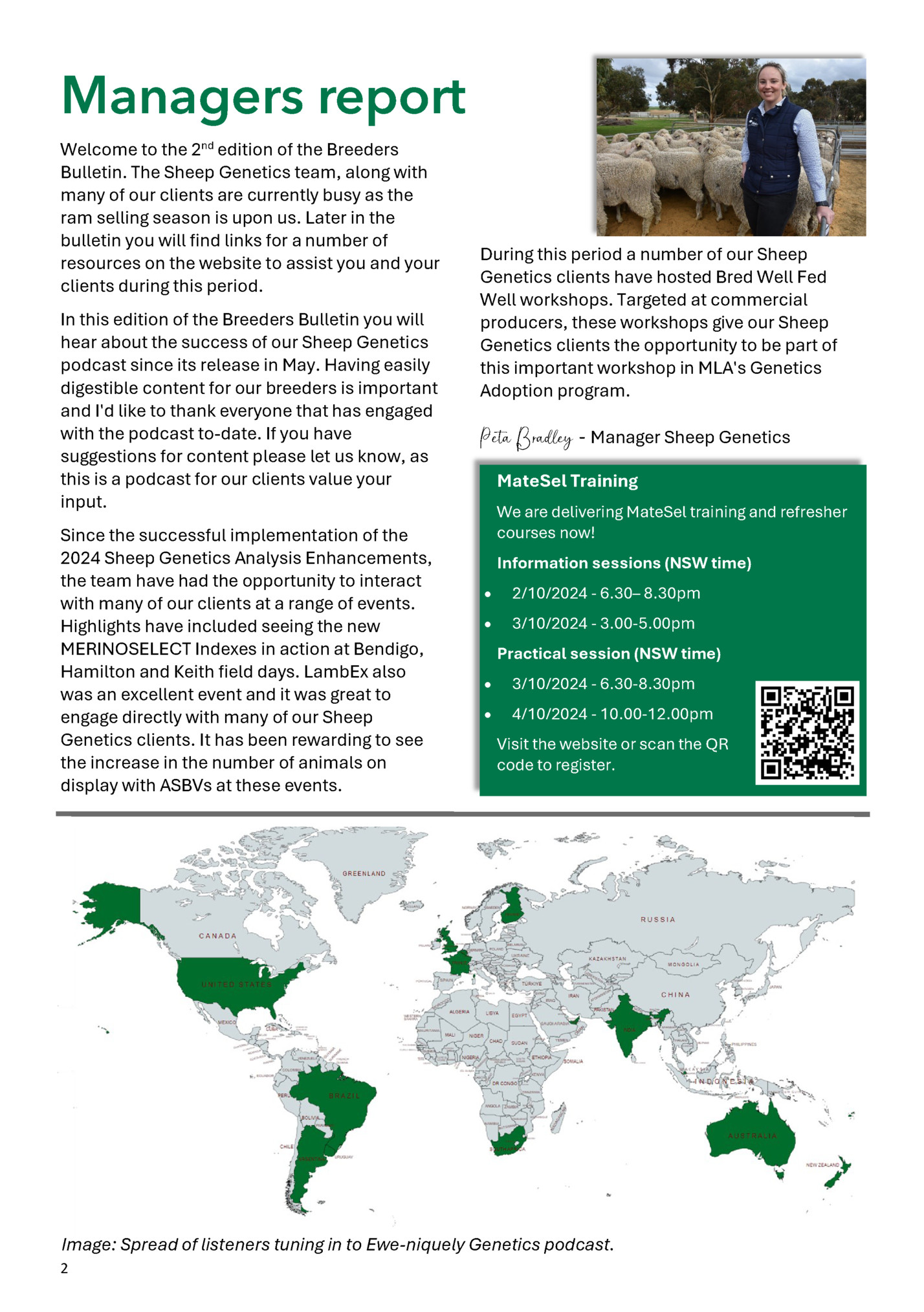
by Sheep Genetics Scan the QR below to check out all the episodes now on Spotify. Since its launch on May 1st, the new podcast initiative from Sheep Genetics, which aims to provide industry insights, has received a great response, with 6 episodes released so far. As of the 5th of September, there were 618 listens on Spotify alone totaling more than 192 hours of listening! While 90% of those listening in have been from Australia, there has been a widespread international audience as well reaching 16 countries, many of which have existing international clients. See image on page 2. Each episode sees our host, Sheep Genetics Development Officer, Chloe Bunter and her special guest go in depth and drill down dedicating time to gain a better understanding of the topic, position in industry and how our industry can learn from or better utilise genetics. The series started with a look back through history to the events that led up to the creation of Sheep Genetics as we now know it, from LAMBPLAN beginnings in the 1990s to the formation of MERINOSELECT and Sheep Genetics in the mid 2000s. Rob Banks and Alex Ball, in Episodes 1 and 2 respectively, provide the details industry sentiment, concerns, triumphs and the learnings from this pivotal frontier period of our history as they reflect on their time in Sheep Genetics. Fiona McLouglin in her 23 years at the company reflects on the changing roles and personnel that have made Sheep Genetics. Listen along as Fiona explains how the Advisory and Technical committees, who are made up of representatives across industry, provide feedback and support the advancements made to Sheep Genetics. Episode 5 explores the ever changing, ever developing world of genetics research. Sarah Day joins us to explore funding sources, project outcomes and a better understanding unique to the Australian Sheep and Beef genetic delivery pipeline, that enables research results to be delivered directly to industry via Sheep Genetics and BREEDPLAN. Following on from this improved understanding of how the research within genetics works we back onto a deep dive into genetics Adoption and Extension with Episode 6 and Clara Bradford. Clara takes us through her learnings in this space from challenges in making a technical scientific process more accessible to industry, the differences across beef and sheep, how producers can get more involved at all levels and what learnings we can leverage going forward. You can find all the episodes now on Spotify, by scanning the QR code. The series moves on in Episode 3 to focus on the integral but often overlooked aspects of Sheep Genetics that are Reference Populations and Analysis Enhancements. Peta Bradley joins us to explain how these two aspects of the analysis allow the development and advancement we have seen, particularly in the last 5 years. Learn how new traits, genomic tools, upgraded processing, reporting and use of data are underpinned by these two pillars of work. Following on we see Episode 4 discuss the committees and team that are Sheep Genetics. 3
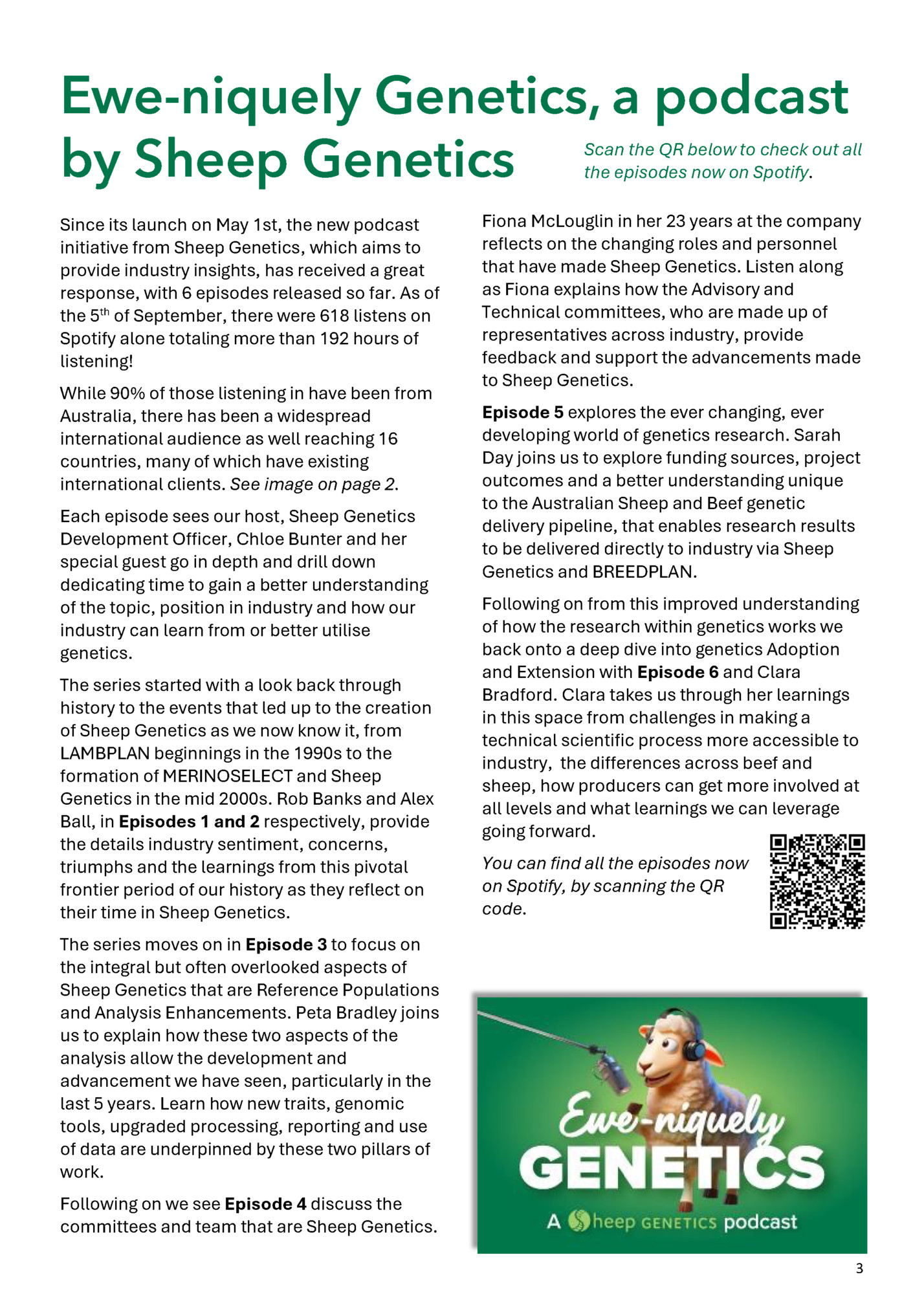
The Resource Flock aims to collect difficult to measure phenotypes like eating quality traits, from a diverse range of sires which are reflective of the Australian sheep industry. Progeny from the Resource Flock are also genotyped, which ultimately contributes to the larger sheep reference population (animals with both a genotype and phenotype). The Resource Flock underpins the ability for Sheep Genetics members in flocks across Australia to leverage genomic information, allowing animals without a direct phenotype to receive ASBVs for hard-to-measure traits. Hence, why animals that do not have a direct measure for carcase and eating quality traits like intramuscular fat, lean meat yield, and shear force receive IMF, LMY, SHEARF5 ASBVs. The current Resource Flock also measures progeny for novel traits like methane and feed intake, which will be used in the future to develop ASBVs for difficult to measure sustainability traits. The Sheep Genetics analysis also has improved linkage through the continuation of the Resource Flock, as well as improved accuracy of ASBVs from genomic predictions. Ultimately, the benefits of the Resource Flock are seen across the Sheep Genetics evaluation and impacts each flock in the evaluation that records and submits phenotypes and/or genotypes. The Resource Flock entering a new project phase. As of July 2024, Sheep Genetics implemented an additional fee for Sheep Genetics members which is directly contributing to the costs associated with running the Resource Flock for the next 2 joining's. Ultimately, the 2025 and 2026 lambs are funded though the Meat and Livestock Australia Donor Company and financial support through a direct industry contribution from Sheep Genetics Members and leveraged funding from the University of New England (UNE), Murdoch University and the Western Australian Department of Primary Industries and Regional Development (WA DPIRD). This additional fee will ensure that Resource Flock data will continue to underpin the Sheep Genetics evaluations for the next 2 years’ worth 4 of joining’s. All Sheep Genetics members have the opportunity to nominate sires and benefit from the Resource Flock. Since the start of the Resource flock under the former Sheep CRC the research projects have helped to facilitate the recording and measurement of progeny from just over 5,000 industry sires from right across the Australian sheep industry. The 2025 joining will select 115 sires which are representative of the diversity of breed types within the industry. Ewes at the Kirby research site at UNE and the WA DPIRD research site in Katanning will be artificially inseminated and progeny from these matings will be genotyped and phenotyped with the traditional on-farm measures and the complete suite of carcase traits including but not limited to intramuscular fat, lean meat yield and shear force. The lambs will also be part of the Low Methane Sheep project with these same lambs recorded for methane production and feed intake. All data collected in the Resource Flock is uploaded to the Sheep Genetic database and directly feeds into the current MERINOSELECT and LAMBPLAN evaluations. The Resource Flock data has and will continue to underpin the research and development behind the annual advancements to the genetic evaluations .
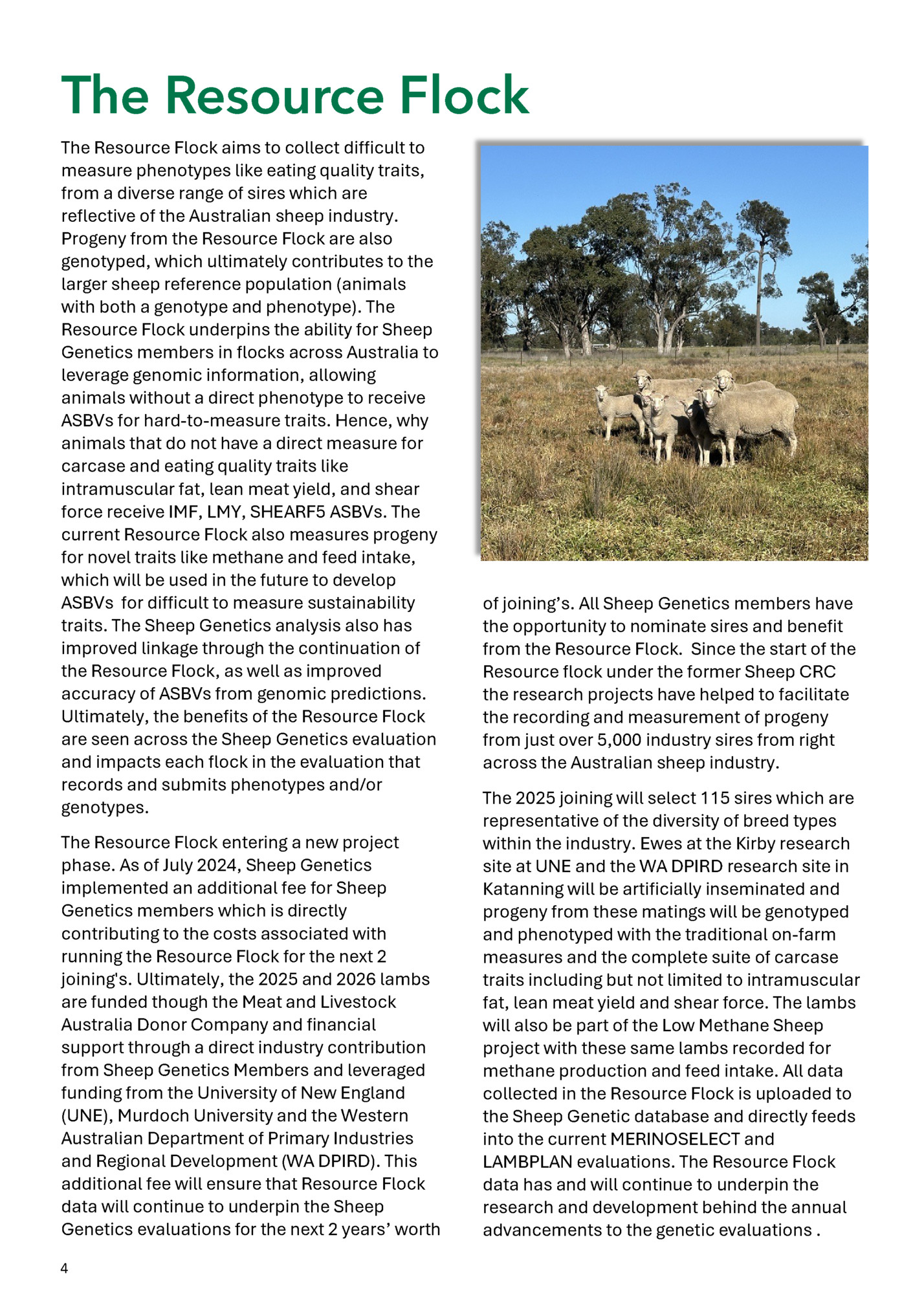
Flock, to SG members as a whole, is dependent on its ability to measure animals that reflect both the diversity of the broader population but also the genetics that are and will be of influence into the future. The final sire list will be chosen so as to ensure that the relationship between the reference population and industry sires of the future is both high and reflects the diversity of the industry. The Resource Flock is also an important source of across flock linkage within the evaluations so sires represented across flocks and years are also desired (young sires likely to be used are also favourable). Consequently, the Resource Flock continues to respond to changes in the industry population as breed types have become more influential. An example is the influence of ‘shedding’ breeds within the reference. Recent adjustments (2024 analysis enhancements) in the LAMBPLAN analysis to expand the genomic reference was enabled as a result of including these breeds within the Resource Flock. Image: Proportion of progeny by breed type. The sire nominations are now open for the 2025 joining for the Resource Flock and close on the 30th September 2024. To nominate rams for the 2025 Resource Flock, please fill in the form using the QR code. The selection criteria will be based on relationship to sires already in the Resource Flock, genetic diversity and index values. Please note that breeders will not be reimbursed for the cost of semen or semen collection. Despatch and freight costs will be covered by UNE/MLA. Scan the QR code to nominate sires. The following graphs over the page show ASBVs for IMF compared to LMY, and PWT compared to SHEARF5 for progeny from sires submitted to the Resource Flock in the 2022 joining. 5
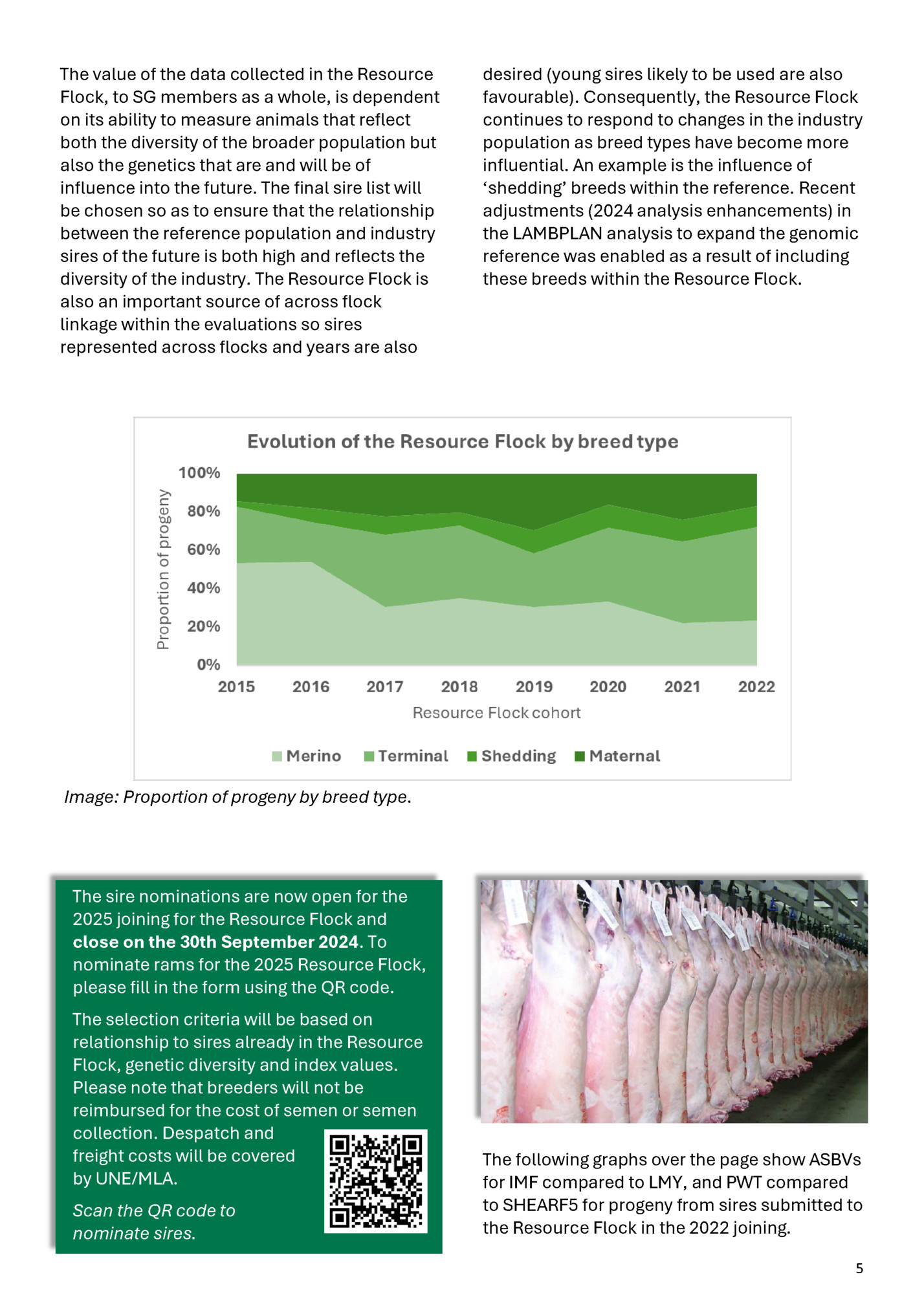
indicative of the sires submitted to the Resource Flock. It is evident from the data that there is a diverse range in performance for all sire breeds for all growth, carcase, and eating 6 quality traits. This reinforces the message that there is as much variation within a breed for a trait as there is across breeds. The progeny from the 2023 Resource Flock joining are currently being processed and having meat science traits collected.
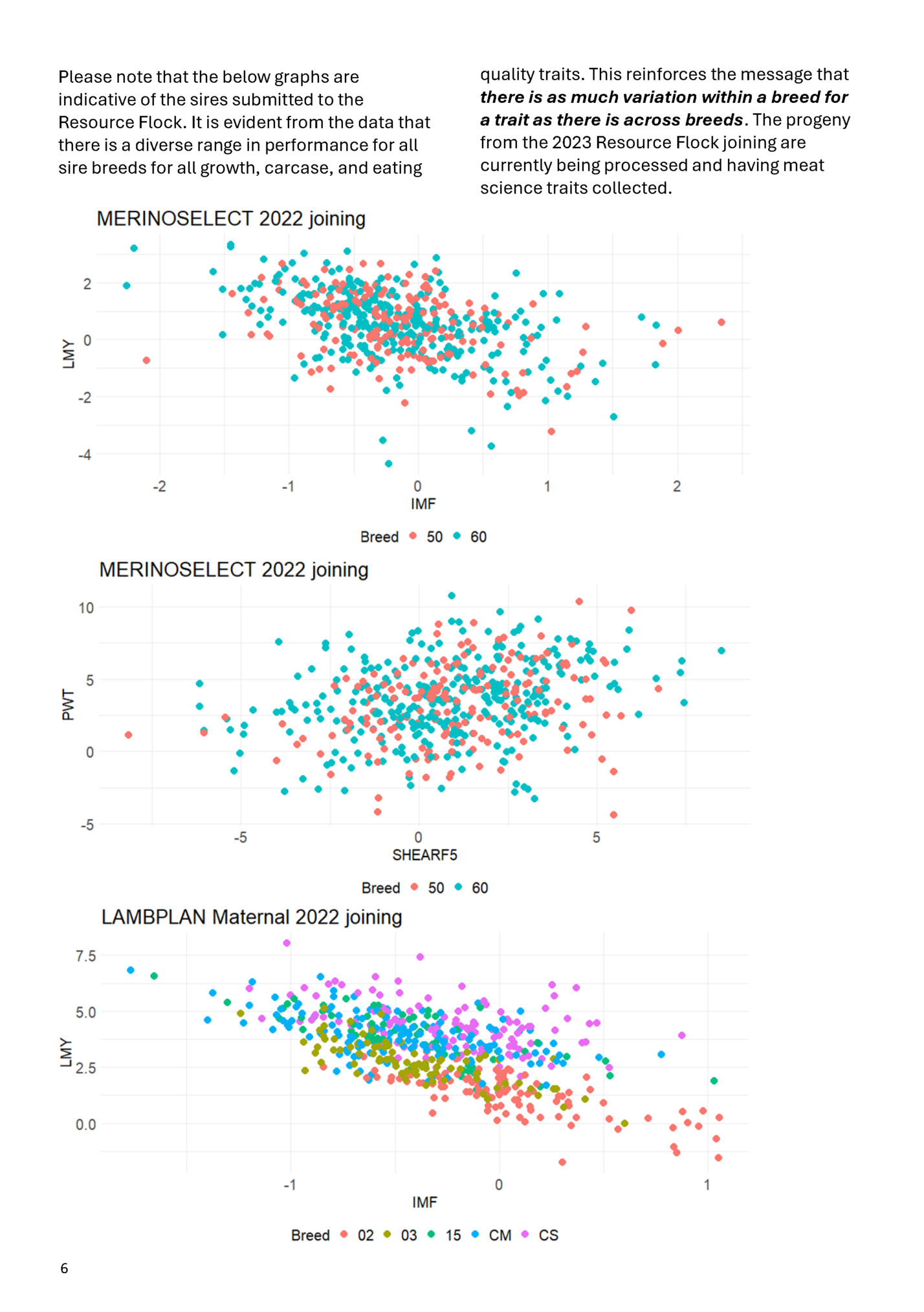
www.sheepgenetics.org.au/resources/mla-resource-flock/ 7
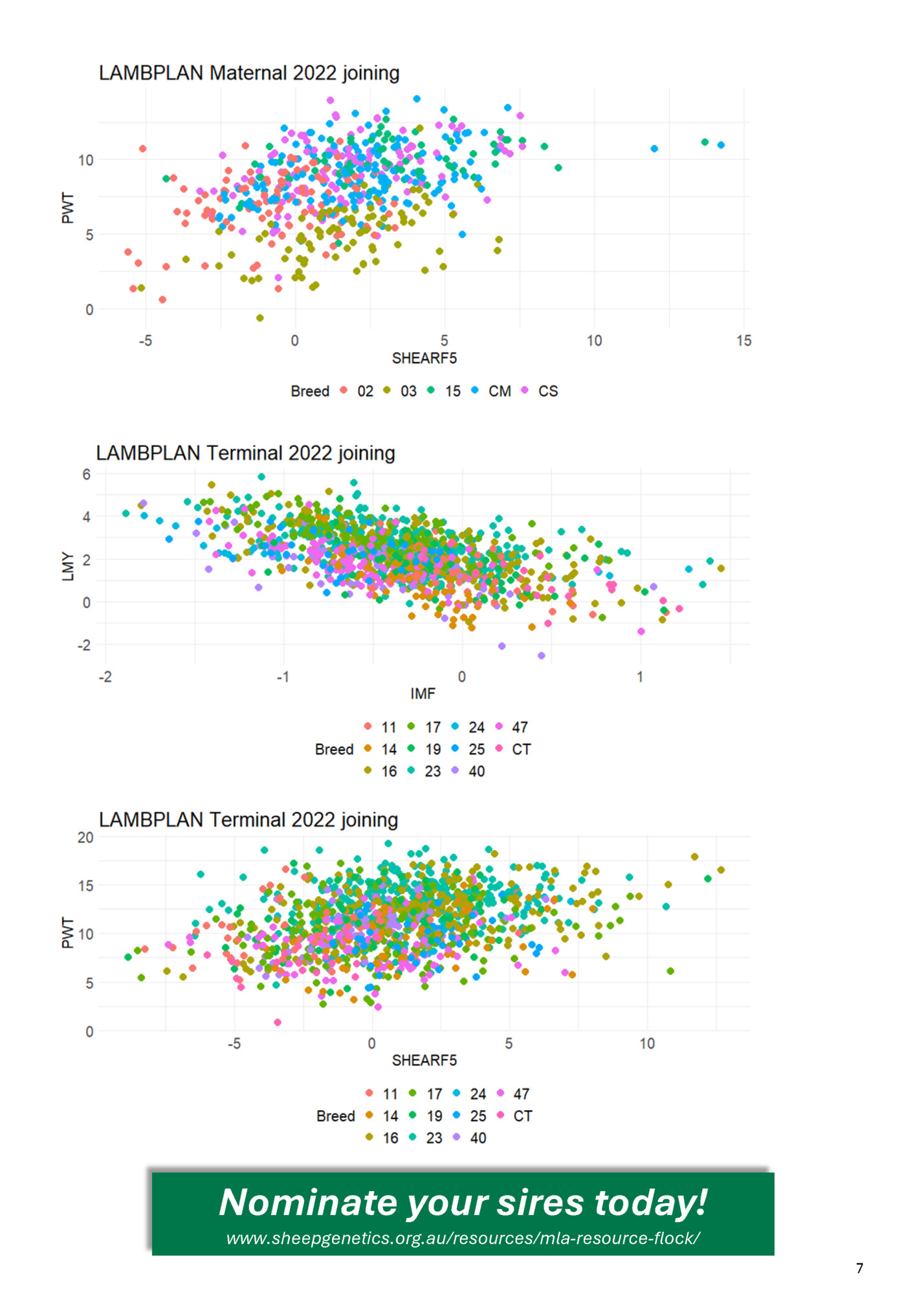
Fat and muscle scan data measured after the 1st of January 2023 with a missing/invalid scanner ID in the data submission are excluded from the analysis as of May 2024. It is a requirement of the analysis that fat and muscle scans recorded in all Australian flocks are taken by an accredited scanner. Sheep Genetics run an annual accreditation program for fat and muscle scanners each year to ensure that the phenotypes are measured accurately and reliably. To find a Sheep Genetics accredited scanner, please scan the QR code below or visit the Sheep Genetics website. The below table contains contact information for the Sheep Genetics accredited scanners, up to date as of September 2024. NAME STATE LOCATION Tim Lawrence NSW Armidale Ben Simmons NSW Dunedoo Rick Power NSW Goulburn Jake Burey NSW Holbrook Trevor Pearce NSW Young Nick Lawrence SA Bordertown Ian Bradtke SA Peterborough Rachel Chirgwin SA Saddleworth Chris Parker VIC Hamilton Hamish McCrae - P VIC Hamilton Tamesha Gardner WA Kojonup Mike O'Neill WA Noggerup Peter Moore WA Williams CONTACT 0419 147 419 timlawrence1974@gmail.com 0419 426 500 bensimmons73@yahoo.com 0437 131 925 richard.power@nutrien.com.au 0427 507 409 jburey01@gmail.com (02) 6383 3330 0428 993 061 tpscanning@gmail.com 0447 077 705 pinnaclesuffolks@bigpond.com 0407 729 341 ian@lazerline.com.au 0428 600 265 info@racfarming.com.au 0429 992 477 info@summitpark.com.au 0447 838 598 mccraescanning@gmail.com 0408 001 353 stocksmart@idavale.com 0409 684 332 micviconeill@bigpond.com 08 9885 1461 0427 176 332 scanwest@bigpond.com Find a full list of service providers to help your business on the link below or scan the QR code. www.sheepgenetics.org.au/service-providers/ 8
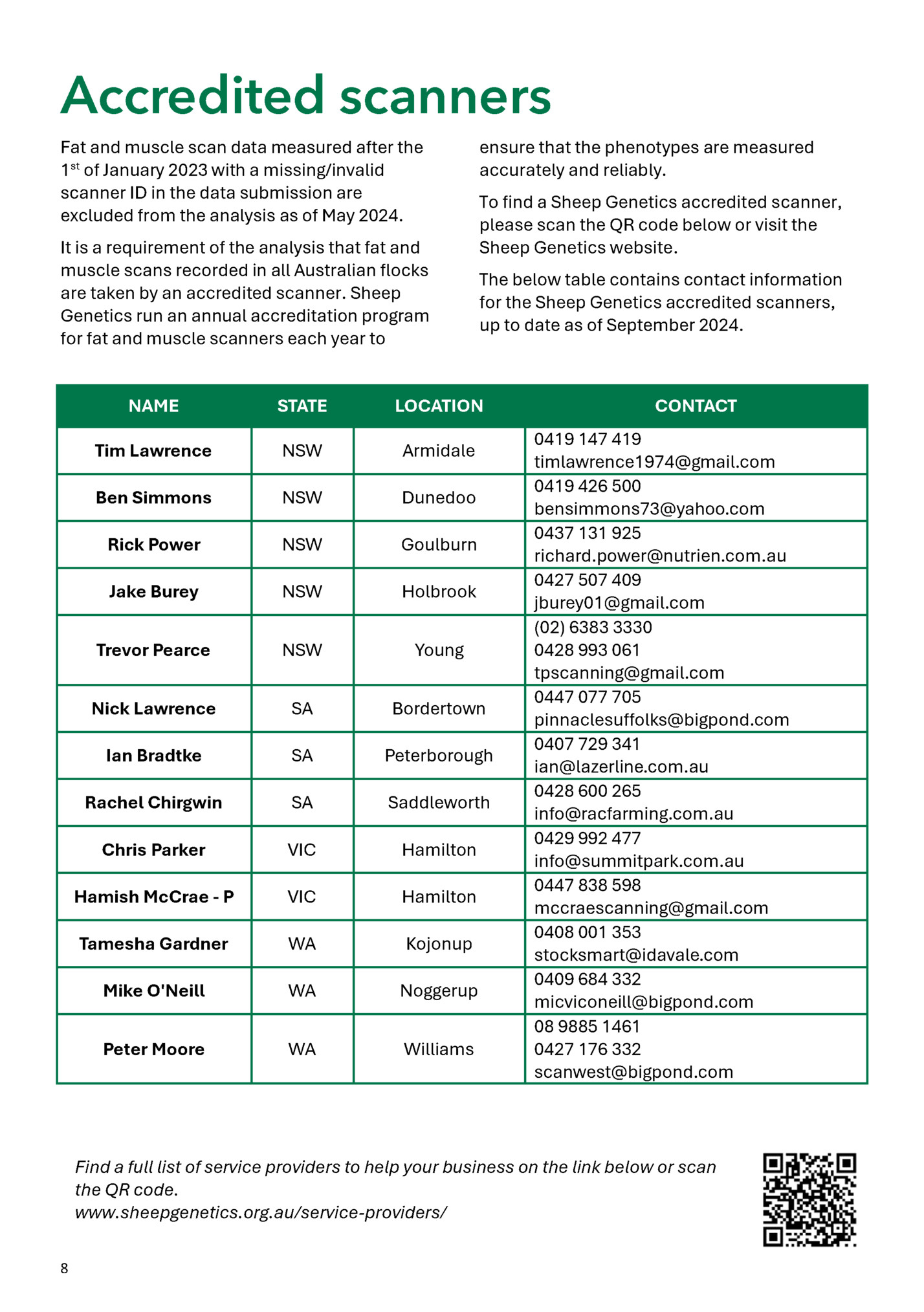
Sheep Genetics would like to extend our congratulations to Steve Milne who is retiring after almost 25 years of carcase scanning! Across the course of his career, Steve has scanned 751,946 sheep included in Sheep Genetics evaluations. Steve developed a passion for genetics and breeding while working under Jim Gough with Corriedales and Herefords, and furthered his knowledge graduating from the University of Sydney with a Master of Animal Science (Animal Breeding Management). Steve and his wife Debbie extended this love for performance recording when they established their stud, Waratah White Suffolks, and later Richmond Hill Agribusiness. Steve’s dedication to the sheep industry extended well beyond being a carcase scanner to being recognised as a lifetime member of the Hamilton P&A sheep society, establishing the LAMBPLAN performance classes at both Sheepvention and Adelaide Royal Show, and being on the Australian White Suffolk Association (AWSA) Federal Council for 14 years, where he also served a term as President of the AWSA. Steve is also a current member of the National Livestock Genetics Consortium (NLGC) Taskforce, where he acts in an advisory capacity as part of this formal industry consultation platform. We wish Steve all the best in his retirement and hope that the golf courses are good to you! Genetics toolkit One-on-ones With sale season well and truly upon us, Sheep Genetics has put together a variety of resources that might be useful for your newsletters, social media and sale catalogues. Online one-on-one video meetings can be arranged between breeders and Sheep Genetics Development Officers in specific circumstances: You can use the link, print out physical copies or create a QR code to help your clients better access these resources. Understanding ASBVs and using them in their selection decisions will help your clients increase their genetic gain for traits of importance. •To discuss a detailed on-going query Scan the QR code or check out the news section on out website for all the links. •To do a data audit e.g. exclusions, reproduction counts, genomic pedigree inconsistencies, genetic trends and the data quality score report. •To discuss data collection and submission Scan the QR code for more information, or to book time. 9
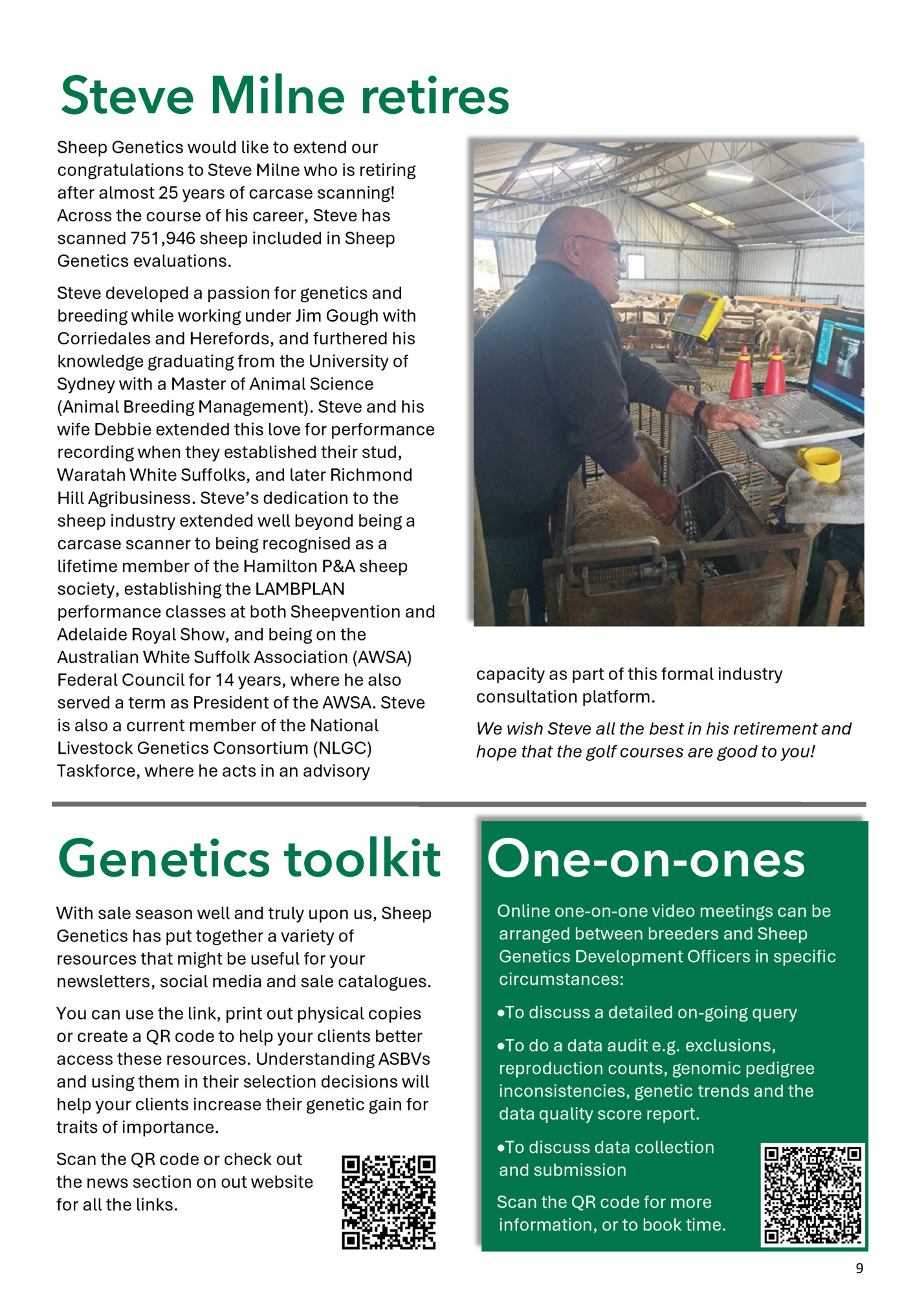
Fleepit Digital © 2021